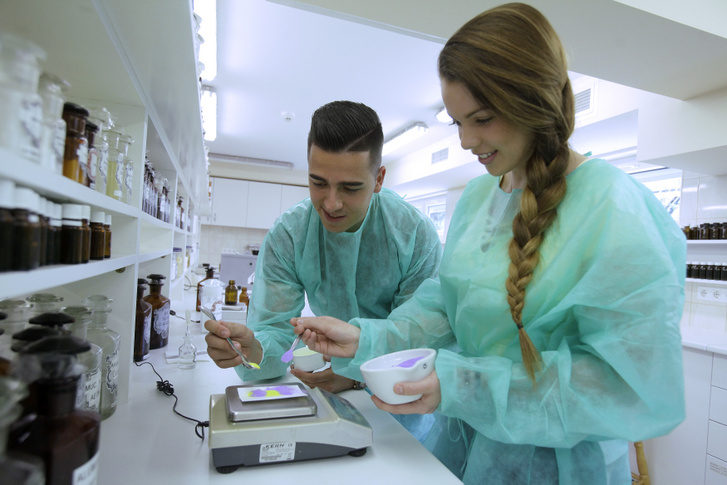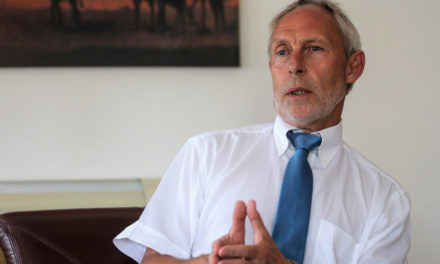According to the plan, the new building of the National Manufacturing-Research-Education Center and Faculty of Pharmacy located in the industrial park of the University of Debrecen will be completed by the end of the year, which will raise the standard of the nearly three-decade-old training to a completely new level. The investment fits perfectly into the concept dreamed up by the university senate, which is intended to create a complex health industry ecosystem in the city of Cívis.
Although the foundation stone was laid only in March this year, the idea of the investment goes back much longer than that. Back in 2015, the Senate of the University of Debrecen decided that the health industry should be the main focus area of the higher education institution, which includes patient care, hospital treatments, the use of healthy foods, the production of medical instruments and the production of pharmaceuticals. The latter is an essential element if only because the pharmaceutical industry in and around Debrecen is significantly stronger than the European Union average, and at the regional level, this sector ensures the livelihood of many people, so it is not surprising that there is also a great need for supplies.
"It is a key and strategic issue for us to be able to develop pharmacy education as much as possible, and I must say that we are not doing badly. We have taken serious steps to ensure that, in the near future, students can study in an environment where everything from education to research to entering the market, including production, is available."
Prof. Dr. Zoltán Szilvássy, the rector of the institution, pointed out.
University teacher Prof. Dr. Béla Juhász reminded that although the Faculty of Pharmacy is celebrating its twentieth anniversary this year, the department itself started its first year in 1996, so the first students graduated in 2001.
"I was one of them, so I understand exactly why a new, modern building is needed just because of my personal involvement. The training never had a real home, and although there were efforts to change it - for example, a blueprint was already prepared over the years - the previous management did not consider development important, even though its inherent potential is huge. I think it is not an exaggeration to say that with this step we can become the best university in the area"
- said the university professor of the Institute of Pharmacology and Pharmacotherapy of the Faculty of General Medicine.
Prof. Dr. Ildikó Bácskay, dean of the Faculty of Pharmaceutical Sciences, director of the Health Industry Institute, believes that the students have a huge opportunity, as they will be able to study in a complex where they can follow the entire process of the pharmaceutical industry.
"The contractors have placed two viewing windows at the production plant, so young people preparing for the field can not only learn, but also see with their own eyes how industrial production takes place. In this way, the theory heard in class can also be put into practice"
- pointed out Ildikó Bácskay, adding that although the project will be completed this year, according to the plan, on December 15, the relocation of the faculty will only start in February, as the university will cover from its own resources the elements that are not included in the application, but which are definitely necessary for moving in, such as for example the complete furnishing of the building. For the operation of the plant, among other things, a complete quality assurance system must be built and permits must also be obtained, so production can only begin after these have been built.
Industry players are being increasingly involved
The exact direction in which the work starts depends to a large extent on the market demands, because the university management considers it fundamental that the activities connected to the institution are well thought out, well organized, goal-oriented and, not least, useful from a business point of view.
The University of Debrecen has close relations with important players in the pharmaceutical industry, including Richter NyRt., Meditop Gyógyszeripari Kft., Fluart Kft. and Teva Zrt. also conducts consultations, so they usually only start research if the industry results are clear and tangible.
This kind of innovative thinking, able to respond to current challenges, is not only present in research, but the training courses are also designed with this approach in mind, which is why a completely new pharmaceutical development research management master's course will start next fall semester. The input requirements will be varied, as today, in addition to doctors and pharmacists, biologists and biotechnologists are in great need of this type of knowledge.
"What is deadly now will not be so in the future"
According to the rector, the Faculty of Pharmacy, which is being remodeled, is special not only for the reasons mentioned above, but also because it is located in the university's industrial park, right next to the Innovation Center, the PILOT Research Laboratory and the National Vaccine Factory.
"We are creating a health industry ecosystem where the elements are extremely closely connected"
Prof. Dr. Zoltán Szilvássy pointed out.
When asked how the operation of the PILOT Research Laboratory stands two and a half years after the handover of the Innovation Center, he answered: it is almost ready, and research has already started there, which was triggered by the decline in the effectiveness of antibiotics. As is well known, hospital infections are an increasing problem, patients quickly become ill, and pathogens are often resistant to already known preparations.
"At the same time, every bacteria has a specific deadly enemy, we want to introduce these bacteria-killing viruses into the body. For this, we use the most modern microbiological and pharmacological methods, the ampoules produced by us can bring a significant improvement in just a few hours. This means that the disease that is still deadly now will no longer be so in the future," the rector explained, adding that this is just one of the areas where they are making great strides forward, in addition to other viruses and bacteria. they would also develop effective pharmaceuticals against it, which do not yet exist, even though there would be a demand for them.
They are reviving the long-standing domestic vaccine production
The PILOT laboratory can also support the research tasks of the National Vaccine Factory, based on the results of the R&D activities carried out here, it can be considered what other vaccines Hungary can produce in addition to the mandatory and recommended vaccines.
Although many people believe that the idea of the National Vaccine Factory was a sudden reaction to the coronavirus epidemic, in reality this is not the case. With the cooperation of the University of Debrecen, a decision was made already in 2017 to revitalize the sector with a long history in our country.
Béla Juhász recalled that Zoltán Szilvássy made a "Nostradamus prophecy" that year, in which he outlined that a pandemic would soon come, and also predicted its main events.
"How could you see this? - we asked, and the rector declared: the answer is very simple.
"When I was a high school student, there were only about four billion people on earth, now that number is eight billion. In addition to the fact that there are many more of us and we can travel without restrictions, it was obvious that sooner or later this would have consequences. Today we encounter diseases that we have not even studied. That's why it's important that if we have a special task similar to the Covid epidemic, we can react quickly" -
stressed Zoltán Szilvássy, noting that this is highly supported by the health industry innovation ecosystem being developed at the University of Debrecen.
Béla Juhász believes that we will be that much ahead in the event of another pandemic, and it was already confirmed in the previous one that those who gain time, gain life.
In the end, Ildikó Bácskay drew attention to the fact that the main task of the university in this process is to provide support in a multidisciplinary approach to unavoidable industrial actors such as the National Vaccine Factory, as well as to provide for the education of replacements.
Featured image: University of Debrecen












